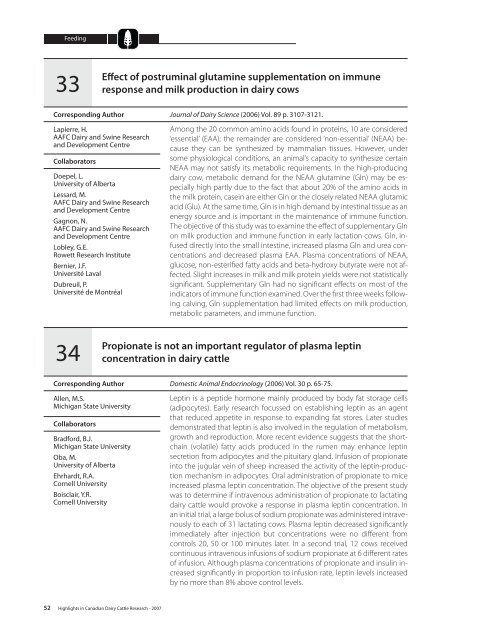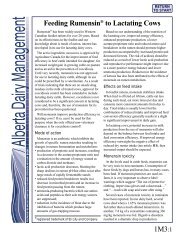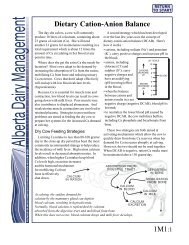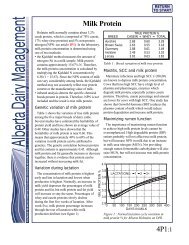A52-75-2007E.pdf - AgroMedia International Inc
A52-75-2007E.pdf - AgroMedia International Inc
A52-75-2007E.pdf - AgroMedia International Inc
Create successful ePaper yourself
Turn your PDF publications into a flip-book with our unique Google optimized e-Paper software.
Feeding33Effect of postruminal glutamine supplementation on immuneresponse and milk production in dairy cowsCorresponding AuthorLapierre, H.AAFC Dairy and Swine Researchand Development CentreCollaboratorsDoepel, L.University of AlbertaLessard, M.AAFC Dairy and Swine Researchand Development CentreGagnon, N.AAFC Dairy and Swine Researchand Development CentreLobley, G.E.Rowett Research InstituteBernier, J.F.Université LavalDubreuil, P.Université de MontréalJournal of Dairy Science (2006) Vol. 89 p. 3107-3121.Among the 20 common amino acids found in proteins, 10 are considered‘essential’ (EAA); the remainder are considered ‘non-essential’ (NEAA) becausethey can be synthesized by mammalian tissues. However, undersome physiological conditions, an animal’s capacity to synthesize certainNEAA may not satisfy its metabolic requirements. In the high-producingdairy cow, metabolic demand for the NEAA glutamine (Gln) may be especiallyhigh partly due to the fact that about 20% of the amino acids inthe milk protein, casein are either Gln or the closely related NEAA glutamicacid (Glu). At the same time, Gln is in high demand by intestinal tissue as anenergy source and is important in the maintenance of immune function.The objective of this study was to examine the effect of supplementary Glnon milk production and immune function in early lactation cows. Gln, infuseddirectly into the small intestine, increased plasma Gln and urea concentrationsand decreased plasma EAA. Plasma concentrations of NEAA,glucose, non-esterified fatty acids and beta-hydroxy butyrate were not affected.Slight increases in milk and milk protein yields were not statisticallysignificant. Supplementary Gln had no significant effects on most of theindicators of immune function examined. Over the first three weeks followingcalving, Gln supplementation had limited effects on milk production,metabolic parameters, and immune function.34Propionate is not an important regulator of plasma leptinconcentration in dairy cattleCorresponding AuthorAllen, M.S.Michigan State UniversityCollaboratorsBradford, B.J.Michigan State UniversityOba, M.University of AlbertaEhrhardt, R.A.Cornell UniversityBoisclair, Y.R.Cornell UniversityDomestic Animal Endocrinology (2006) Vol. 30 p. 65-<strong>75</strong>.Leptin is a peptide hormone mainly produced by body fat storage cells(adipocytes). Early research focussed on establishing leptin as an agentthat reduced appetite in response to expanding fat stores. Later studiesdemonstrated that leptin is also involved in the regulation of metabolism,growth and reproduction. More recent evidence suggests that the shortchain(volatile) fatty acids produced in the rumen may enhance leptinsecretion from adipocytes and the pituitary gland. Infusion of propionateinto the jugular vein of sheep increased the activity of the leptin-productionmechanism in adipocytes. Oral administration of propionate to miceincreased plasma leptin concentration. The objective of the present studywas to determine if intravenous administration of propionate to lactatingdairy cattle would provoke a response in plasma leptin concentration. Inan initial trial, a large bolus of sodium propionate was administered intravenouslyto each of 31 lactating cows. Plasma leptin decreased significantlyimmediately after injection but concentrations were no different fromcontrols 20, 50 or 100 minutes later. In a second trial, 12 cows receivedcontinuous intravenous infusions of sodium propionate at 6 different ratesof infusion. Although plasma concentrations of propionate and insulin increasedsignificantly in proportion to infusion rate, leptin levels increasedby no more than 8% above control levels.52 Highlights in Canadian Dairy Cattle Research - 2007





